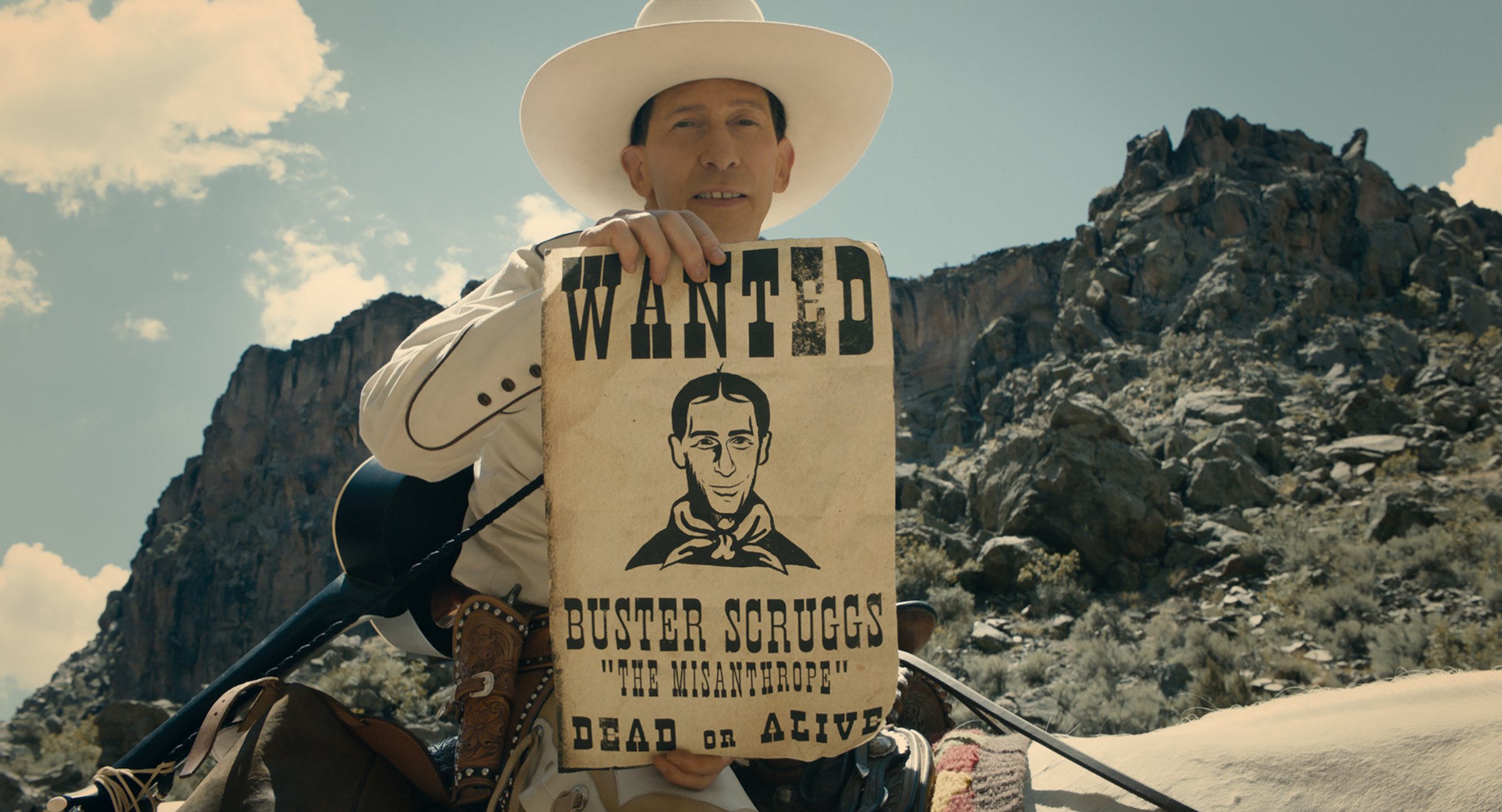
Some days a cheerful outlook just won’t do. For those days, there’s Joel and Ethan Coen’s The Ballad of Buster Scruggs, a book of cowboy tales written in movie language and playing in competition here at the Venice Film Festival. This little anthology, produced by Netflix, starts out at a jaunty canter and becomes progressively more grim, ending with a stagecoach headed, quite literally, for death’s door. Though there are dashes of the Coens’ trademark arch humor, most of The Ballad of Buster Scruggs isn’t what you’d call a laugh riot. There’s also something genuinely mournful about it; it leaves you feeling a little exposed, as if you’d been dropped, alone, into the wide-open prairie and weren’t sure you wanted to be there. It’s effective in a somber way, and as shot by cinematographer Bruno Delbonnel, it’s dazzling to look at, a reinvention of classic literature of the old west with a storybook feel.
The visual framing device of The Ballad of Buster Scruggs is an actual book, inspired by those worn-looking cloth-covered volumes you can still find in used bookstores, the kind with a few line illustrations and buried treasure bound in every twenty pages or so, in the form of a vivid color plate. The hand of an unseen person opens this particular book—its chapters have titles like “The Gal Who Got Rattled” and “The Mortal Remains”—and each is illustrated with a glorious illustration in the style of the great early 20th century illustrator N.C. Wyeth. Rendered in moody tones of ochre, azure blue and deep tomato red, depicting the cowboys and prospectors and sideshow attractions we’re about to meet, these pictures are so beautiful you might wish you could gaze at them longer. But even just glimpsed briefly, as a visual introduction to each of the movie’s stories, they work like gangbusters.
The most enjoyably ridiculous story is the opener, “The Ballad of Buster Scruggs,” in which we meet Tim Blake Nelson as the balladeer of the title. Scruggs is an outlaw dressed in pristine white, including a comically oversized hat that highlights his protruding ears. Scruggs is wanted for murder, but he makes it clear that he’s not a misanthrope. He kills only cranky, obnoxious men, guys who are practically begging for it. After he offs one in a saloon—employing a clever physical trick that you don’t see coming, resulting in a gunshot wound to the miscreant’s face—he jumps atop the bar and launches into a toe-tappin’ little number about his victim, a crabby liar and cheater named Surly Joe. Sample lyric: “He was never any fun/Now his grumpy face is run.”
From there, the Coens tread into increasingly darker territory, in vignettes featuring actors like James Franco, Tom Waits, Saul Rubinek and Tyne Daly; just about everyone who shows up is terrific. The standout segments include “Meal Ticket,” in which Liam Neeson plays the calculating caretaker and “owner” of a legless and armless man (Harry Melling) who recites soulful poetry—everything from Shelley’s “Ozymandias” to the Gettysburg Address—to increasingly dwindling audiences of pioneer townsfolk. This entry just might be a metaphor for the shrinking numbers of people who care about reading and literature, having been drawn away by clickbait and other assorted internet junk; you wouldn’t put that past the Coens. And in “The Gal Who Got Rattled,” Zoe Kazan plays a reserved young woman—her most noticeable feature, after her soulful saucer eyes, is her hair’s prim Emily Dickinson middle part—heading across the prairie as part of a wagon train. She’s accompanied by her not-so-bright older brother, and she’s traveling far to meet a man who may or may not become her husband. Tragedy intervenes. A kind guide, Billy Knapp (Bill Heck), steps in to help. At one point, there’s a brutal attack by Indigenous American warriors: Now that the codes of westerns as entertainment have been rewritten, it’s hard to know how to feel about this, but it’s safe to say that the original Americans would have every reason to feel rage at white people who stole their land outright.
“The Gal Who Got Rattled” ends happily for no one. The Ballad of Buster Scruggs includes a few made-up ditties (like the silly ones sung by Buster), but the Coens favor authentic murder ballads and sorrowful songs imported from our forebears in the British Isles: Here and there a character will pipe up with a song about a woman being hanged for an egregious murder or a man being cut down in his prime. This, the Coens seem to be saying, is how we became the people we are. Part of our legacy is the Americana of cowboy boots and ten-gallon hats, but much of the story is darker. The Ballad of Buster Scruggs is storybook lore, enjoyable in the way we always enjoy tall tales that have been handed down from one generation to the next. But it’s also laced with melancholy. We stole a whole country. Now we have to live with it.
More Must-Reads from TIME
- Cybersecurity Experts Are Sounding the Alarm on DOGE
- Meet the 2025 Women of the Year
- The Harsh Truth About Disability Inclusion
- Why Do More Young Adults Have Cancer?
- Colman Domingo Leads With Radical Love
- How to Get Better at Doing Things Alone
- Michelle Zauner Stares Down the Darkness
Contact us at letters@time.com